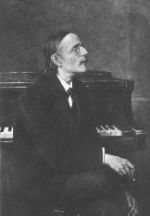Les tres Bes

"Les tres Bes" és una frase feta derivada d'una expressió encunyada per Peter Cornelius l'any 1854, el qual va afegir Hector Berlioz com la tercera B al costat de les reconegudes de Johann Sebastian Bach i Ludwig van Beethoven. Anys més tard, el famós director Hans von Bülow afegiria Johannes Brahms per substituir Berlioz. La frase s'utilitza en xerrades de música clàssica per referir-se a un lloc destacat de Bach, Beethoven, i Brahms entre altres compositors.
En un article al Berliner Allgemeine Musikalische Zeitung, Cornelius va incorporar Berlioz com la tercera B, concloent el seu article amb l'exclamació, "Bach, Beethoven, Berlioz!"[1] Dècades més tard, Bülow va elaborar el següent calembour en un escrit a un amic: "Mein musikalisches Glaubensbekenntniss steht in Es dur, mit drei B-en in der Vorzeichnung: Bach, Beethoven, und Brahms!"[2] B, en la terminologia musical alemanya, representa la nota si♭ així com pel signe ♭. El comentari pot ser traduït, més o menys, per "El meu credo musical és en la clau de mi bemoll major, i conté tres B[-♭]s en la seva armadura: Bach, Beethoven, i Brahms!" A Bülow li atreia la idea d'una classe de Santíssima Trinitat de la música clàssica,[2] i va escriure en la dècada de 1880: "Crec en Bach, el Pare, Beethoven, el Fill, i Brahms, l'Esperit Sant de la música". També va connectar Beethoven i Brahms per referir-se a la Primera Simfonia de Brahms com la Desena Simfonia de Beethoven.
Niccolò Paganini havia identificat cap el 1838 a Berlioz com el successor digne de Beethoven. I, de fet, Hans von Bülow, també havia afirmat que Berlioz era "el successor immediat i més energètic de Beethoven".[3] Hi ha hagut experts (David Matthews) que han proposta afegir una "quarta B" que seria Benjamin Britten.[4]
En la cultura popular
[modifica]- En una tira de Peanuts (publicat el 22 de febrer de 1952), quan Schroeder comença a tocar el piano, Charlie Brown diu que "has sentit de Bach, Brahms, i Beethoven, oi? Bé, des d'ara serà Schubert, Schumann, i Schroeder."
Referències
[modifica]- Fonts
- Jacques Barzun, Hector Berlioz and the Romantic Century, Vol. II, Nova York: Columbia University Press, 1969.
- Alessandra Comini, The Changing Image of Beethoven, Santa Fe: Sunstone Press, 2008.
- Nicolas Slonimsky, Slonimsky's Book of Musical Anecdotes. New York; Schirmer Books, 1998.
| Biografia | |||||||||
|---|---|---|---|---|---|---|---|---|---|
| Música |
| ||||||||
| Cultura | |||||||||
Text is available under the CC BY-SA 4.0 license; additional terms may apply.
Images, videos and audio are available under their respective licenses.

